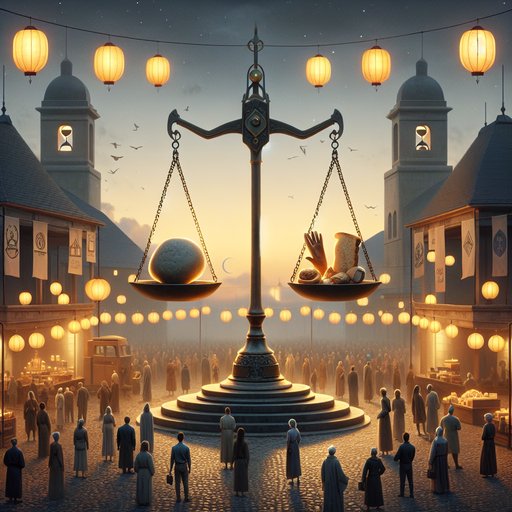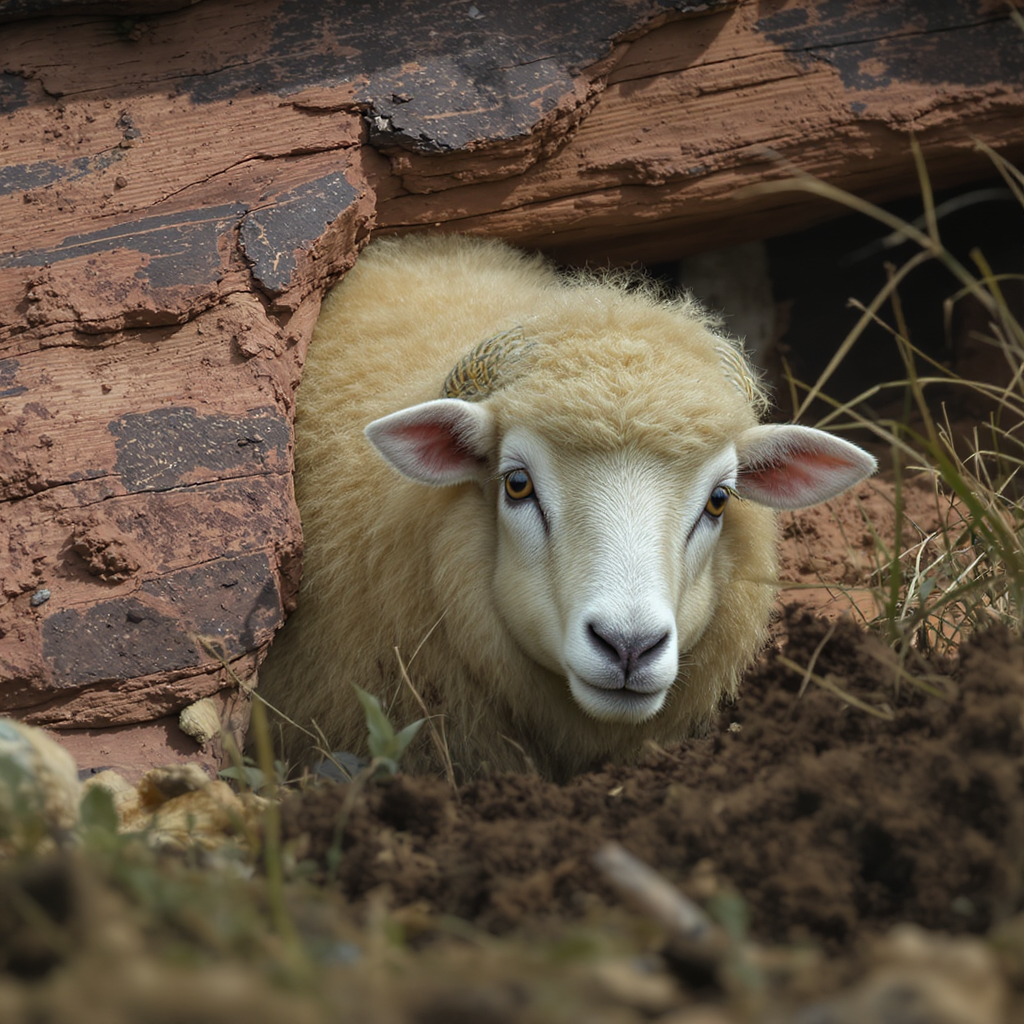
On the day when the city weighs joy, they string the square with lanterns and drag old iron scales from their storerooms, their chains polished until they gleam like winter water. People bring what they think a good life is made of—loaves from shared ovens, ledgers of hours given to others, scraps from cathedrals they helped repair, a glove kept after a long winter of care. We gather because it is our way to turn questions into festivals. I come with an empty pocket and a smooth river stone, invited to lay it on one of the scales before dusk and to declare a way of living. The banners that fringe the square suggest many ways. The hourglass in the bell tower dribbles its pale sand, and I go walking to see what kind of weight my hands could bear.
At the edge of the square, an orchard breathes out its warm sweet. The keeper walks between the rows with pruning shears in his palm. He shows me a branch that has grown wild and another that has stunted itself, and finds the balance of the cut, not too much, not too little. He makes it look like listening.
Boys come to learn the habit of hands—how to thin fruit so the bough won’t break, how to wait until a pear yields to a thumb with a sigh. The keeper laughs when a bee tangles in his hair and says that excellence hides in ordinary steps, in the comfort of expertise earned one morning after another. He offers me a pear, and it tastes less like sweetness than like patience. I pocket the stem and keep walking.
Down by the harbor, the flags are stiff as speeches, and gulls stitch the air with their rough thread. A woman with tar on her wrists tends rope like a midwife. She shows me a knot that refuses to slip, and another that loves to loosen. She hears someone curse at a winch and doesn’t turn.
Wind isn’t her business, she says. That boat will pitch or be still whether we wish it; this tangling of fiber under her hands is within reach. When a fishing line snaps and a man howls, she does not echo it. She tightens the line she can, and his voice drops with his shoulders.
Behind her, a storm darkens the edge of the water like a rumor. She wipes her palms and says, if you make your peace with the horizon, you can serve the deck. Beyond the harbor, a gate yawns into a garden, and the air is full of oil and thyme. The table is laid not with extravagance but with things that have learned to live together: bread with its soft interior, olives that glitter like eyes, cheeses sweating salt, figs leaning toward collapse.
Their cook is a small person with a soft voice and a quick laugh that makes the wine brighter. Between plates they speak not in fat-slick slogans but in careful invitations—come, sit, taste, look how this is enough. When I reach for a third slice of bread, she taps my wrist lightly and smiles; enough can be too much if you don’t guard it. There are toasts to friends who have died, and the joy is not less for the grief that folds around it.
When I leave, my mouth remembers, and I do not feel deprived. In the next street, a bridge arcs from bank to bank like a sentence drawn carefully across a page. Men and women measure with string in the wind, counting their strides, whispering the burden of a minute saved multiplied by a thousand crossings. One woman in blue chalks small circles on a slab—everyone who will get an hour of their life returned when the bridge is done.
She scrapes the circles with her sleeve when she hears a complaint from a man whose riverside stall will be in shadow. She does not dismiss him. She lists out loud the possible paths: leave the tree, reroute the ramp, add a lamp. They draw numbers into the dust.
The tree leans, ancient and unconsulted. They decide to cut it only after they plant two elsewhere while the stall keeper chooses a new corner. There is relief and sadness dancing together at the edge of the decision. I cross the square under an arch whose stones have sworn to endure.
Inside the hall it holds, there are no banners, only light and a table with a worn groove where a certain book has lived. An old magistrate stands with a small pouch in her hand. She found it on the steps and has not opened it. She asks, as if to no one, what kind of world would exist if each person took what was unguarded when they wanted.
A young boy says that world would be easy for him, until he imagines his own pouch on another step. The magistrate returns the pouch to the messenger whose name is stitched in its seam, and she does it without joy or reluctance, and the room feels cleaner. Doing what is needed, she tells me later, is not a branch of happiness; it is the trunk that allows anything to grow without leaning crooked toward its own advantage. Further along is a gate without a door.
On entering, I’m unsure if anything has changed; there is only a broom, a rake, a bench, a hush that is more than quiet. A young monk sweeps the path slowly, not because he is lazy but because there is no reason not to. He gestures for me to sit, and we watch dust halo the bristles, the way it rises and falls with a breath no one owns. He tells me, not as instruction but as a joke, that his first month here he tried to sweep away thoughts with leaves and gave himself a blister.
He now lets them pass like stray cats. Across the lane from the gate, an old woman pours tea in a room hung with name tablets. She asks my grandmother’s name; her mouth forms its syllables like a spell. She tells me the proper way to set a bowl, to fold the cloth, to speak so as to gather a room instead of tearing it.
In her house, the good life is a fabric of small, repeated gestures that pull people near enough to share it. Heat hammers in the afternoon, and I find shade beneath a leaning eave where a smith beats an iron bar into something with a purpose. Sparks pin his shirt with a constellation. He lets me hold the hammer once, and it feels like a secret that could crush me if I cheated it.
He tells me how the work he did last year is not enough for this year’s hand, how he wakes with a boredom that is a map toward the next hill to climb. There are people, he says, who call him too proud. There are others who worship his noise. He says neither will do.
Across the narrow street, a carnival blooms—the masked and the perfumed laughing with their bodies, drums that make the ribs remember they are cages. A woman takes my hand and drops a cherry into my mouth and tells me the only honest scale is tonight. For a breath I want only her world. For another, only the iron’s.
Then the two worlds bruise each other so loudly I back away and my teeth ache from sweetness and from restraint. When I return to the square, a painter stands where the woven goods should be and lays color on a tilt of canvas that looks like weather made private. He tells me he has refused all houses because his life will not consent to their names. He says a choice is not a ring you wear but a door you cut yourself.
I wonder if he’s merely lonely and good at making it art. I am about to argue when a child begins to cry. She’s small enough that the crowd is an ocean that has forgotten her name. The rope woman ties a line between a post and her palm.
The magistrate whistles a note until the musicians still. The cook lifts a bowl onto a barrel and bangs the rim. The carnival woman steps onto a crate and calls out a game, and people turn toward her voice. I kneel and meet the girl’s eyes and say, we are going to find your mother.
The painter looks at me as if I have solved his life differently than he expected. Dusk is the city’s favorite color. The bell tower coughs. People begin to set their offerings on the scales.
A row of pear stems accumulates with their quiet curve. There are hooks hung with ropes, coins that turn the lamplight into errors of hope, leaves brushed from the temple gate, a clean ledger with names and hours, a child's ribbon from the hall of ancestors. The iron bar goes up and up the smith’s arms and he sets it down with both palms flat and a sigh that might be relief. The carnival woman lays a single cherry pit.
The magistrate hems the hem of her sleeve and offers nothing visible. When it is my turn, I realize I have carried the stone all day, that my pocket is full of small proofs of other people's lives. I set none of these down. I raise my hands so they are empty and then press them together in front of me as if they are listening.
The scales do not move. People murmur. The old man from the orchard, who has never hurried me, nods as if he has just watched a leaf fall on the exact morning it was ready. After, the night stirs us into smaller circles.
I am asked by a cousin whether I have chosen a way. I tell her I might adopt a habit instead: to ask the right question for the hour. What needs my hands; what can be waited out; what is worth delight; what must be given to the many; what must be done though no one thanks me; what can be set down; what keeps us close; what permits me to become larger than the person I was afraid to be; what is simply alive tonight. She laughs and says that is not a house but a map no one can print.
I say perhaps the good life is less a place than a way of walking, less a flag than a practice of attention. She plucks a lantern from the line and gives it to me. It is not heavy. It is not light.
It is exactly the weight of its burning.






































